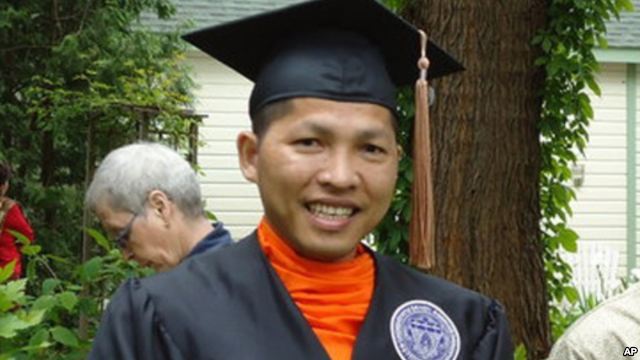 Venerable Somnieng Hoeun with school kids
Venerable Somnieng Hoeun with school kids
Quad-Cities Online (Moline, Illinois, USA)MOLINE -- Use a "living" text to study Buddhism.
The Venerable Somnieng Hoeurn, a visiting Theravadian monk from Cambodia, will give a free public lecture from 7 to 8:30 tonight in Theater Room 306 in Building 1. Black Hawk College, 6600 34th Ave., Moline.
"It's rare to have a Buddhist monk in this area, and to have the chance to learn about Buddhism and hear Buddhist chanting -- a tradition rooted in one of the oldest languages in the world," college professor Galen Leonhardy said. "He's a living text we can all study."
His lecture is part of an ongoing Humanities 101 Outreach project at Black Hawk, and studying religions offers a great way to explain and pass on a humanities' tradition and understanding, Mr. Leonhardy said.
"All religions offer people wonderful and beautiful ways of framing reality," he said.
The Venerable Somnieng will discuss "who was the Buddha, what is Buddhism, and what is Buddhist chanting all about?" according to college fliers advertising the lecture. He'll also demonstrate his chanting abilities, described by Mr. Leonhardy as "a beautiful art form."
"He has a wonderful voice," Mr. Leonhardy said. "And I love to hear his insights. Somnieng is a beautiful human being who's doing good things for a lot of people."
In Cambodia, the Venerable Somnieng spends considerable time working in orphanages. He also devotes a lot of energy to education. For example, he's establishing a college scholarship program for monks and young Cambodian women.
Highly educated Cambodians were systematically executed in the 1970s by the Khmer Rouge, a revolutionary socialist party.
"Rebuilding Cambodia's college-educated population has been difficult," Mr. Leonhardy said.
Free-will donations will support the Venerable Somnieng's mission, and his stay at a Midwest Buddhist Education Center, at 216 Locust St., Davenport, while he continues his studies at St. Ambrose University.
More people are becoming aware of the center's existence and about the developing Buddhist community in the Quad-Cities, Mr. Leonhardy said. Less is probably known about the Buddhist presence, however, compared to the Hindu and Islamic communities, "but we're truly becoming a pluralistic society," Mr. Leonhardy said.
The lecture is designed simply to inform and educate people about Buddhism, not as an attempt to convert anyone, he said. "Converting, or proselytizing, tends not to occur in Buddhism," he said.
"Buddhism is a process-orientated method of overcoming suffering we experience, and it offers inner peace," Mr. Leonhardy said.
The Theravada form of Buddhism draws scriptural inspiration from the Tipitaka, or Pali canon, which scholars generally agree contains the earliest written records of the Buddha's teachings, college materials say.
Theravada, pronounced "terra-va-dah," is the predominant religion of continental Southeast Asia including the countries of Thailand, Myanmar/Burma, Cambodia and Laos, and Sri Lanka.
It's also the form that has taken root in America, according to college materials.
Learn more about it tonight by studying a "living text."





























